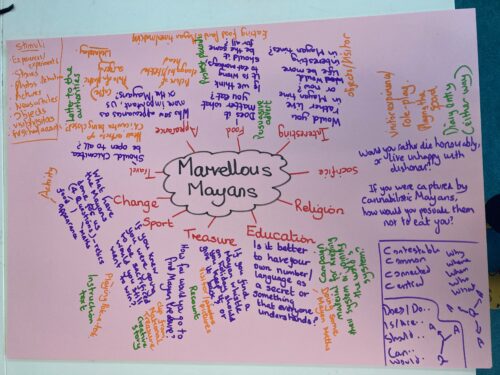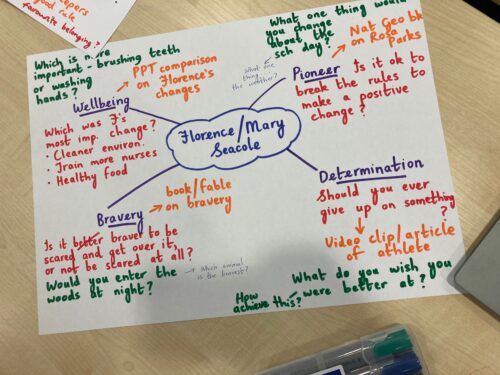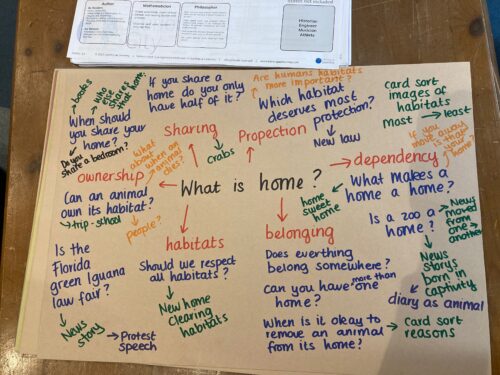Do you want to find the philosophical in your topics?
You know enough about P4C to value its contribution to your school. Teachers enjoy facilitating discussions and have seen philosophy make an immediate impact with their pupils.
However, you feel staff need extra support in crafting their own sessions into their topics, so that P4C becomes an integral and sustainable part of their long-term planning.
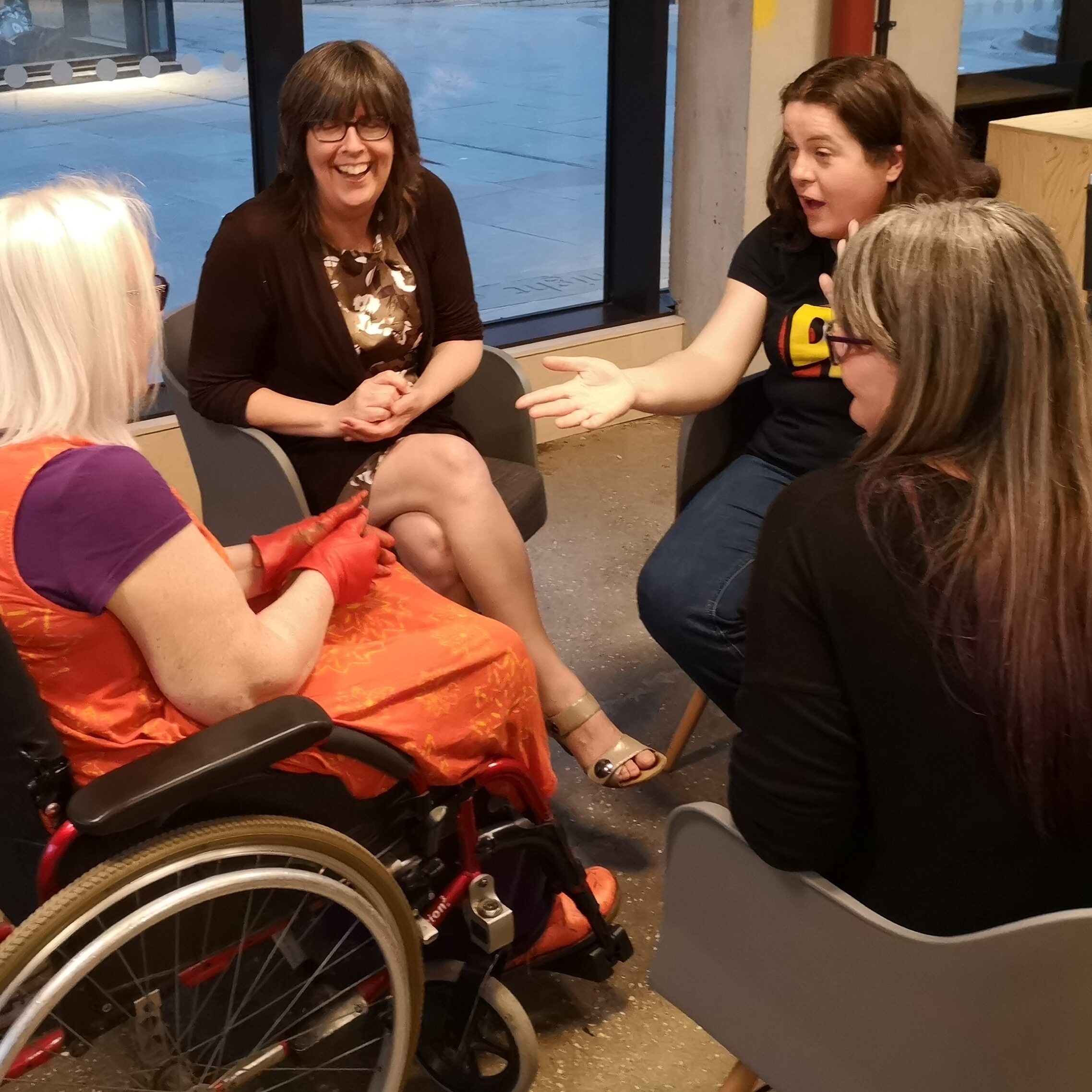
Curriculum Clinics: One-to-one Collaboration with Teachers or Year Team Groups
Curriculum Clinics give teachers or year teams personal tuition and coaching in embedding P4C sessions into their topics. We explore their established curriculum plans and work with them to pinpoint opportunities for where deep philosophical questions can push their and challenge their pupils.
These personal sessions can build upon training the teacher may have already had to ensure P4C doesn’t get squeezed out by other commitments, and ensure philosophical discussion remains a central component of their short, medium and long-term plans.
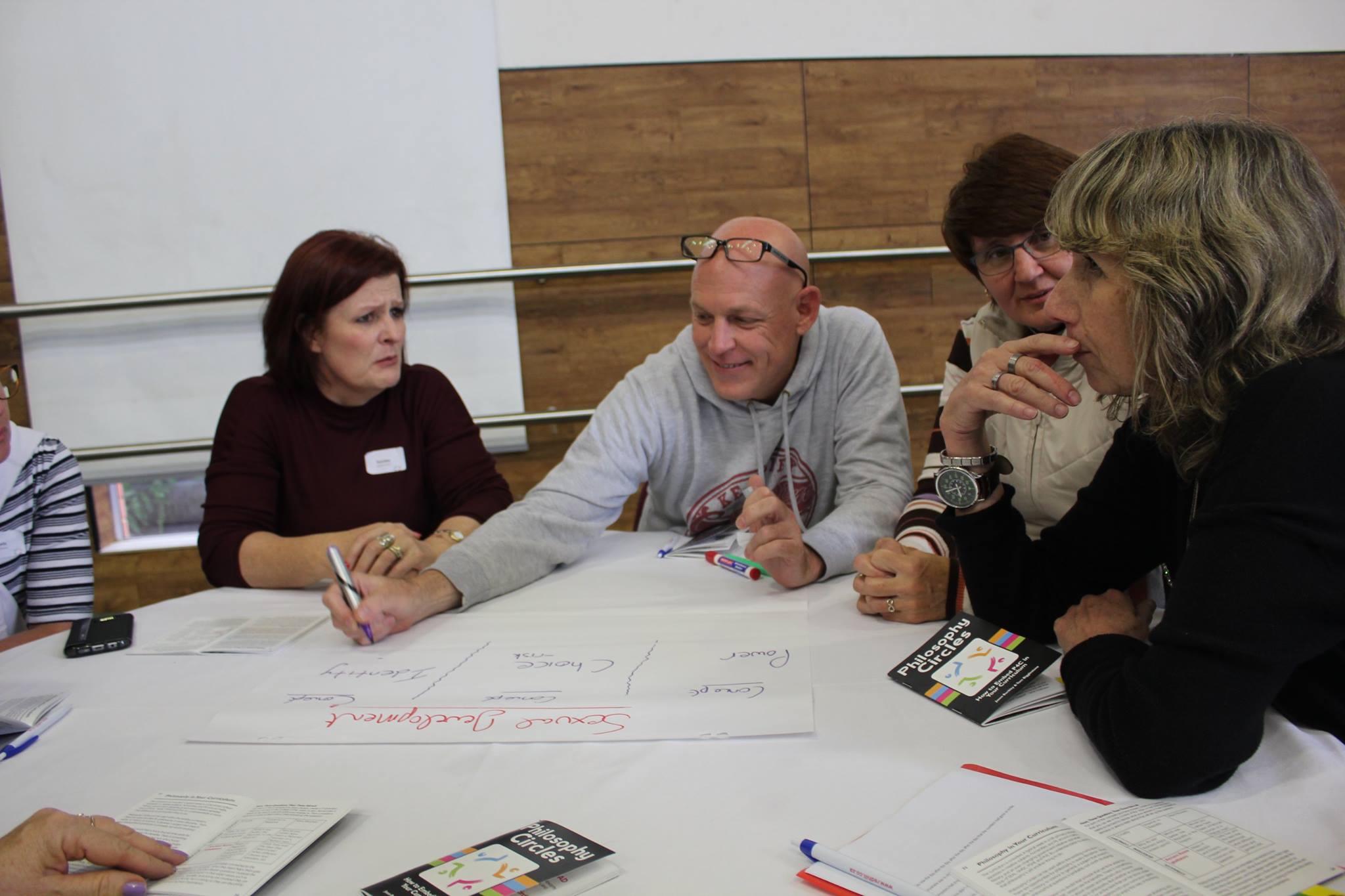
Arrange a call with Tom
Set up a call with Tom to discuss how we might be able to help you.
Create a curriculum full of 'deep fun'
More and more children arrive in reception scarcely talking at all
Parents distracted by social media speak less to their children, and the impact is growing. In one school with many younger parents, children joining reception completely nonverbal rose from five, to half to the class.
If they don't learn to talk confidently to groups in their primary years, it's unlikely they ever will. That impacts their learning, and their economic and social wellbeing.
Develop a curriculum that helps pupils overcome the different obstacles they have to speaking:
- When to create shared, immersive experiences that stimulate thinking
- How to identify juicy, contestable questions no matter what the topic
- How to use our series of ‘Spot and Stripe’ videos to get EYFS children speaking
Immediately enhance teachers’ practice
The collaboration starts before the Clinic begins. We ask teachers to send their medium- and long-term plans to use in advance, so we can begin planning with them from the very first minute. By the end of a session, they will have scribbled all over their plans with philosophical questions and potential activities and be buzzing with excitement.
How to find stimuli that encourage thinking, but don't say what to think
It is said anything can be a stimulus, and this often leads to videos, pictures and stories loaded with powerful morals and messages. Curriculum Clinics give staff a deeper understanding of how to spot a stimulus that’ll create philosophical discussions, and which are best left for a winning assembly.
- How to use ‘Reverse, Remove, Exaggerate, Split!’ to create their own stimuli
- How to use the ‘Parable of the Spoons’ rule to test stimuli for objectivity
- How to support deeper reflection about seasonal events such as Christmas, harvest and Easter
Deeper understanding of Y-Questions that stretch but don't scare
Less confident speakers can fear speaking in class in case they get it wrong. That freezes their speaking while more confident children do the talking and speed ahead. The Y-Questions at the heart of Philosophy Circles are difficult to decide and hard to be sure of. This allows less confident learners to feel they won't get it wrong, while giving a greater challenge to able children who are used to getting it right
How to planning less gives more space for children’s independence
With the ever-increasing pressure from above, teachers feel more and more accountable for planning every minute of children’s learning. It creates a dependency culture, with children always looking to the teacher. Curriculum Clinics help teachers plan less, and feel confident to let questions do the work.
BONUS: A whole-school philosophical assembly
The ever-increasing workload on teachers means more effo rt than ever goes into day-to-day classroom practice. This is often to the detriment of whole-school events and programmes – meaning pupils missing out on memorable experiences that broaden their friendship groups and develop their confidence.
rt than ever goes into day-to-day classroom practice. This is often to the detriment of whole-school events and programmes – meaning pupils missing out on memorable experiences that broaden their friendship groups and develop their confidence.
See this in action with a whole-school assembly, with follow-up activities and session ideas, included in the day.
This all sounds great, but what will OFSTED say?
With the relentless focus on data, everything schools do has to show an impact on maths and literacy. Fortunately, not only does OFSTED look very favourably on Philosophy for Children, but a recent EEF study demonstrated that it had a positive impact on both maths and literacy scores. We are excited about philosophy for its own sake, but it’s nice to know that it has a benefit for measurable outcomes, and in particular that it helps to diminish the difference between disadvantaged children and their peers.
‘Philosophy for Children is giving pupils the skills they need to present a point of view and become more articulate, thus boosting their confidence
Ofsted report, St Matthews School, Westminster
“Impressively, year 2 pupils can identify ethical dilemmas in their fiction books and propose related questions for discussion in philosophy lessons” “Philosophy lessons challenge pupils to respond to probing questions, such as, “Are all humans connected in some way?”
Oftsed report, Churchfields Infant School, South Woodford
The school advises and supports other schools in the use of philosophy with children. This exemplary practice is spreading throughout the school and is having a positive impact on pupils ‘communication and thinking skills and this is beginning to be reflected in their achievement. In an excellent philosophy lesson in the nursery children were challenged to think about the characteristics of two imaginary characters and whether they would change depending on their facial expressions or on what they wear. The curriculum is broad and balanced and meets pupils’ needs well, including the excellent promotion of their spiritual, moral, social and cultural development and philosophy.
Ofsted report, Sparhawk Infant and Nursery School, Norfolk
In a year 5 and 6 philosophy lesson, excellent use was made of a recently released Christmas advertisement for a famous store to encourage pupils to identify sophisticated concepts such as reliability, hope, trust and friendliness. This work made a particularly good contribution to developing their social and moral awareness
Ofsted report, North Lakes School, Penrith
‘The thought provoking and exciting curriculum the school has developed over the last two years is an outstanding component of the school’s success (this includes) the development of ‘Philosophy for Children’, a powerful tool which both excites the pupils and gives them the confidence to explore stimulating and challenging ideas and concepts. It not only strengthens their academic learning, but also encourages their empathy for others and gives them insights into the adult world
Ofstede report, Ropsley Primary School
Why can’t teachers just use your resources?
For P4C to have a long-term impact in schools, teachers need to be empowered to generate their own ideas for their own curricula. Although our session plans are extensive, they’re not exhaustive.
By booking Curriculum Clinics, you are giving teachers the opportunity for one-to-one CPD with practitioners who have been innovating at the cutting edge of P4C for years. We’re passionate about teachers becoming P4C planners in their own right so their pupils can enjoy unlimited philosophical enquiries as they progress through school.

How to book
Your whole school day can be filled with curriculum clinics and more We just need half an hour for lunch and a resupply of tea!
To find out more about how we can work with you, fill in the contact form below or email tom@thephilosophyman.com
Interested in this day?
Contact us today to arrange a chat - choose from any of the options below.
Feedback from our recent P4C training:
"I cannot describe the buzz and vibe from the staff, all down to you."
"You really did create a huge buzz in school, which is a difficult shout on the first day back! You covered everything we wanted out of the training and gave us mountains of material to use in class. I loved the fact you gave each phase some planning time to discuss ideas and plan sessions and then trial them out of colleagues. You have definitely given us some inspiration and I am very excited to see what happens next."
"There was a buzz during the staff meeting, which for any member of staff attending a staff meeting knows this is a rare thing! All the staff said how enthused and excited they felt to get back into their classrooms and try out the methods they had been shown."
"The questions raised interested everyone and there was a real buzz in the room. Our training was full of practical activities and games, with the just the right amount of discussion about teaching techniques interspersed. What an inspiring day!"
"It is us who would like to thank you. It was such an inspirational INSET and the staff were truly excited. The enthusiasm is palpable!"
